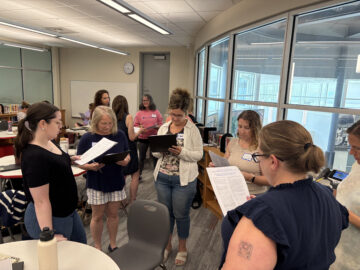New ELA Summer Institute equips teachers with literacy strategies

Teachers work in small groups during the ELA Summer Institute.
“We explore these topics during professional development during the school year, but this opportunity gave teachers the chance to have something in the summer where they had more time to process, reflect, and take in new information,” said Dr. Ryan Thomas, supervisor of curriculum and federal programs coordinator at HHSD.
The HHSD Curriculum Department partnered with the Montgomery County Intermediate Unit (MCIU) to plan and facilitate the program. Sarah Misner, a project consultant in the Office of Professional Development at MCIU, brought her expertise in literacy, while Dr. Thomas and several district literacy specialists shared how the teachers’ new learning can be applied in the District and its ELA resources.
The Pennsylvania Department of Education requires all teachers who hold specific certifications to have training on Structured Literacy, an evidence-based methodology to improve literacy achievement for students. Structured Literacy is informed by the Science of Reading, which highlights five key skills to support effective reading and writing. According to the National Center on Improving Literacy, they are:
1. Phonemic Awareness – Students can identify and play with individual sounds in spoken words.
2. Phonics – Students understand how letters and groups link to sounds to form letter-sound relationships and spelling patterns.
3. Fluency – The ability for students to read words, phrases, sentences, and stories correctly, with enough speed and expression.
4. Vocabulary – Students know what words mean and how to say and use them correctly.
5. Comprehension – Students understand what they are reading.
During the ELA Summer Institute, teachers learned how to establish routines in their classrooms to teach vocabulary and word study skills. They also learned many tools that could be leveraged to gather data to inform their instructional decisions. An example of one of the tools that teachers have expressed trying in their classroom is a spelling inventory, which measures students’ ability to spell grade-level words and gain a better sense of their word recognition and strategies used to decipher unfamiliar words. They also discussed challenges when it comes to older students, who may be struggling with reading.
“Once students have cracked the code of learning how to read, when we think about students as readers, it’s not just teaching them how to comprehend text, but also all of the factors that go into comprehending a text,” said Dr. Thomas. “How do we intentionally build background knowledge before a student enters a text? How do we intentionally build vocabulary skills and syntactically take apart sentences and paragraphs to make sense of them? That kind of systematic teaching was a focus for our teachers in this series.”
On the last day of the ELA Summer Institute, teachers created action plans for how they will implement what they learned into their classrooms. Plans were then shared with school principals, so they can see their thinking and support them during the 2025-26 school year.
“The response we received after the program was incredibly positive. Teachers expressed a desire to bring this to colleagues across the District who were unable to attend. To me, that is a strong indicator of its success,” said Dr. Thomas.

